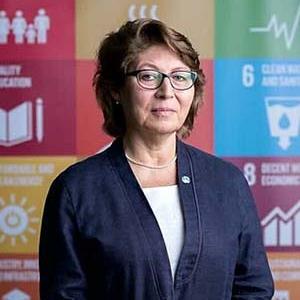Your Excellency President Saleh,
Minister of Migration and Displacement Faeq,
Esteemed Dignitaries, ladies and gentlemen,
It is my honour to be invited here today to attend this conference on addressing the challenges of ending displacement in Iraq.
The problem facing us today is well-known, and has been eloquently described by the previous speakers. So I will not spend time outlining the issues – the Iraqi population know better than anyone the consequences of armed conflict and repeated displacement as a consequence. Instead, I would like to lay out what role the UN can play in supporting Iraq and in finding durable solutions for displaced persons, which means even returning to their own homes, settle safely elsewhere or to make it possible to remain in current settlements.
It is important at the outset, however, to acknowledge the achievements which have been made to date. Almost five million people have returned home since the height of displacement in 2016. Millions of people have managed to resume their lives, their businesses, their family connections. And the UN has been working side by side with the Ministry of Migration and Displacement in assisting in managing IDP camps as well as helping these families return and re-build their lives.
The humanitarian context facing Iraq in 2021 has significantly changed from just few years ago. While needs in Iraq continue to be primarily driven by the effects of the past conflict and rapid camp closures, COVID-19 and the decline in state budget presented an additional shock in 2020 and have driven additional parts of the Iraqi population into vulnerable situation. As a consequence, we have, to the extent possible, adjusted our humanitarian and development support to the current challenges by expanding and refocusing its geographic coverage.
From this point forward, humanitarian actors in Iraq will in 2021 no longer primarily focus on servicing the needs of IDPs living in camps, but instead will concentrate on meeting the needs of both returnees and vulnerable IDPs living out of camps who don’t have the means to lead a stable and self-sufficient life. The needs of these populations can be less visible, but are often more severe as those who still live in camps.
The United Nations and its partners will need to continue to scale-up in areas where we weren’t previously present, and where access may previously have been limited. We will need to provide additional populations with specialized support, such as : host communities, families who have perceived affiliations to ISIL, female-headed households, and children who have never been registered for school. Those who live on the margins of society and cannot rebuild their lives without additional assistance.
However, we also have to acknowledge that not everyone will be able to return home—either because their homes no longer exist, or because their communities are not able to accept them. For this population, alternative solutions will have to be found, whether it is integration with local communities in their areas of displacement, or resettlement elsewhere, all of which will need specialized support.
While the geographic focus of our work is shifting, the needs remain much the same. Iraqis seek the repair and reconstruction of war-damaged homes; the clearance of explosive ordnance; social cohesion; enforcement of social housing, land and property rights; improvements to the security situation; creation of employment and livelihoods opportunities; restoration of basic services; and improvements in access to quality health care and education. All these challenges are substantial and will continue to require an all of government effort as well as all assistance efforts complement each other’s work. The challenges for out-of-camp IDPs and returnees cannot be addressed by international support alone.
Ending the protracted displacement will require sustained engagement of and with government counterparts, at the national, regional and local levels. The 2021 Humanitarian Response Plan outlines the humanitarian community’s detailed plans for the year ahead based on an evidence-based analysis of the needs of IDPs and their communities, and presents the financial requirements needed to achieve its purely humanitarian aims.
As Humanitarian Coordinator, it is my honor to oversee the work of humanitarian partners. As Resident Coordinator, I have to ensure that all UN development work is assisting the government to reach the 2030 agenda. In this context, I pledge that the UN will support the government in addressing the needs of Iraq’s most vulnerable.
Thank you, Excellencies, ladies and gentlemen.



